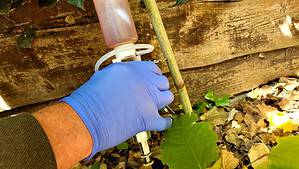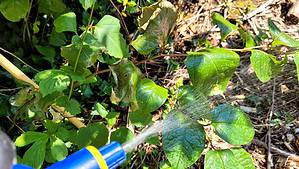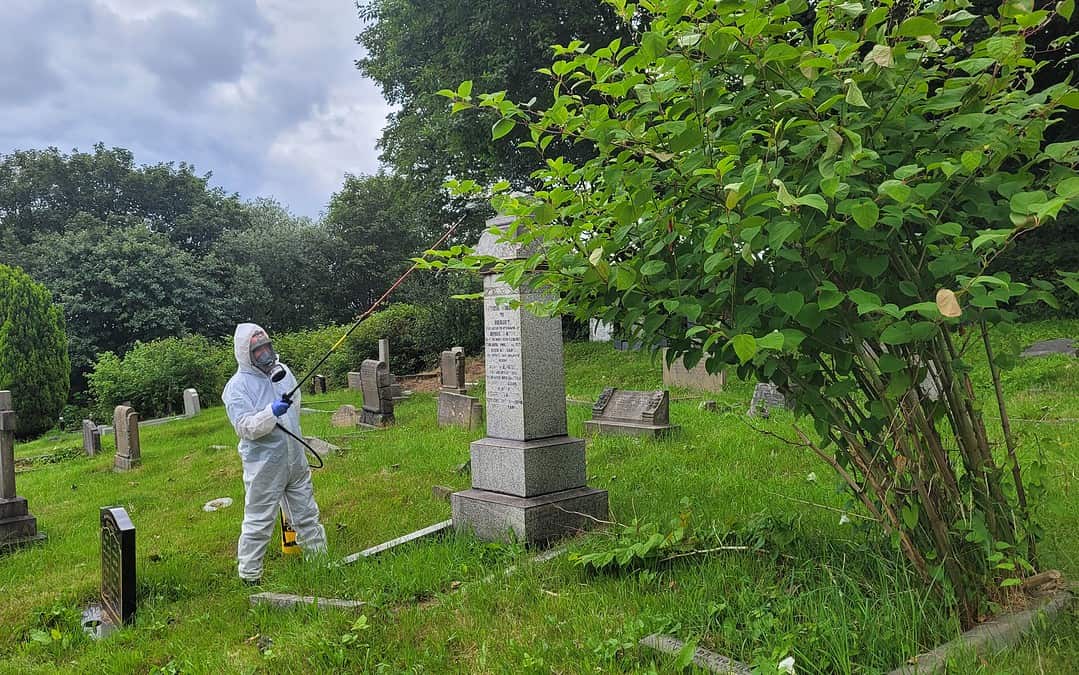What is the best killer for Japanese knotweed?
The most effective and widely used herbicide for controlling Japanese knotweed is glyphosate. Glyphosate-based herbicides are systemic, meaning they are absorbed by the plant and translocated throughout the entire plant, including its extensive root system (rhizomes). This characteristic makes glyphosate highly effective in targeting and killing Japanese knotweed.
When using glyphosate herbicides to control Japanese knotweed, it’s essential to follow these guidelines:
- Professional Application: Glyphosate herbicides should be used by licensed professionals who are experienced in dealing with invasive plants like Japanese knotweed. They will know the right timing and application techniques to maximize effectiveness.
- Timing: The best time to apply glyphosate to Japanese knotweed is during the plant’s active growth phase, typically in late summer or early autumn when the plant is moving nutrients to its underground rhizomes.
- Multiple Applications: Controlling Japanese knotweed usually requires multiple herbicide applications over several years. The rhizomes can be persistent, so follow-up treatments are necessary to ensure successful eradication.
- Site-Specific Considerations: Glyphosate herbicides should be applied with care to avoid damaging non-target plants nearby. Specialists will take site-specific factors into account to minimize environmental impact.
Glyphosate herbicides work by inhibiting a crucial enzyme involved in the synthesis of certain amino acids (the building blocks of proteins) in plants. The enzyme targeted by glyphosate is called EPSP synthase (5-enolpyruvylshikimate-3-phosphate synthase).

Injecting Japanese knotweed Stems
Here’s how glyphosate kills the plant:
Absorption and Translocation:
When glyphosate is applied to the leaves of the plant, it is absorbed and translocated throughout the plant’s vascular system. The herbicide moves down to the roots, where the critical metabolic processes take place.
Inhibition of EPSP Synthase:
Glyphosate interferes with the action of EPSP synthase, an enzyme essential for the production of three specific amino acids: phenylalanine, tyrosine, and tryptophan. These amino acids are essential for the synthesis of proteins, which are necessary for plant growth and development.
Starvation of the Plant:
As EPSP synthase is inhibited, the plant is unable to produce the three essential amino acids. Without these amino acids, protein synthesis is disrupted, and the plant’s ability to grow and maintain essential cellular functions is severely compromised.
Cell Death and Plant Desiccation:
The lack of protein synthesis leads to the disruption of cell division and cell growth, ultimately resulting in the death of plant tissues. The plant gradually becomes desiccated, meaning it loses water and withers as it dies.
Systemic Action:
One of the key features of glyphosate is its systemic action, which means it is translocated throughout the entire plant. This allows the herbicide to reach even the underground rhizomes of plants like Japanese knotweed, ensuring effective control.
Due to its systemic nature, glyphosate is highly effective at targeting and killing a wide range of plants, including many weeds. However, its effectiveness is not limited to invasive plants like Japanese knotweed, making it a valuable tool in weed control when used responsibly and according to the manufacturer’s instructions.

Spraying knotweed?
It’s important to note that while glyphosate is effective, it should only be used by licensed professionals who are trained in handling and applying herbicides safely. Unregulated or inappropriate use of herbicides can have adverse effects on the environment and human health.
If you are dealing with Japanese knotweed on your property or in your area, it is best to seek advice and assistance from experts in invasive plant management to develop a comprehensive control plan that may include glyphosate-based herbicides along with other appropriate methods.
Within the intricate labyrinth of the UK’s legal framework, might one unearth stipulations or mandates specifically addressing the utilization of Glyphosate? How has the nation’s judicial tapestry woven its stand on such a matter, and to what depth does this issue permeate within their codes of conduct?
Glyphosate is a broad-spectrum herbicide known primarily for its use in controlling a wide variety of weeds. Its effectiveness in targeting unwanted plants has made it a popular choice among farmers and gardeners. But as with all chemical agents, proper usage is crucial to ensure both efficiency and safety. In this context, it becomes pertinent to understand the UK’s stance on who can use Glyphosate and under what qualifications.
Does Everyone Have the Right to Deploy Glyphosate?
Simply put, no. Glyphosate, given its chemical nature, isn’t something one can casually pick off a shelf and use without proper knowledge. The UK has established stringent guidelines governing its deployment to ensure it’s used responsibly and doesn’t harm the environment or individuals.
Mandatory Training and Certification
The UK mandates that anyone wishing to apply Glyphosate, especially in a professional capacity, must undergo a set of specialized training. This training is essential to understand:
- The correct dosage
- Appropriate equipment for deployment
- Safety measures during application
- Possible environmental impact
- Disposal of any residual waste
Upon completing this training, individuals are awarded a certificate, which becomes a testament to their knowledge and expertise in handling Glyphosate. This certification isn’t just a formality; it’s an assurance that the person using the herbicide knows what they’re doing.
Who Provides the Training?
There are authorized training centres across the UK, recognized by the regulatory bodies. These centers are well-equipped with both theoretical knowledge and practical experience to provide comprehensive training to aspirants.
Regulation of Sale and Purchase
The sale of Glyphosate to untrained individuals is not permitted. Sellers are required to ensure that the buyer possesses the necessary certification before completing the transaction. This step acts as a secondary checkpoint to make sure Glyphosate doesn’t land in the hands of someone unqualified.
Periodic Renewal of Certification
Knowledge and best practices around chemical herbicides evolve. To ensure that all certified users stay updated, the UK mandates a periodic renewal of the certification. This ensures that those using Glyphosate are always equipped with the latest knowledge.
Consequences of Unauthorised Use
The misuse or unauthorized deployment of Glyphosate can result in legal repercussions. This can range from hefty fines to, in severe cases, incarceration. It’s a testament to how seriously the UK takes the responsible deployment of herbicides.
Glyphosate is Not for Casual Use
The UK’s regulatory framework surrounding the use of Glyphosate emphasizes the chemical’s potential risks when misused. By ensuring that only trained and certified individuals can purchase and deploy Glyphosate, the UK strives to strike a balance between leveraging its benefits and safeguarding its inhabitants and environment. The stringent guidelines are a testament to the importance of responsible and knowledgeable use.
For anyone considering using Glyphosate, either for personal or professional use, the message is clear: undertake the necessary training, obtain the certification, and always stay updated. This not only ensures personal safety but also that of the surrounding environment and community.
In recent years, the herbicide glyphosate has become a topic of intense debate and concern. Glyphosate, commonly known by its brand name Roundup, is one of the most widely used herbicides globally. It has been a cornerstone in modern agriculture due to its effectiveness in controlling weeds. However, questions have arisen regarding its impact on human health. This article delves into the controversies surrounding glyphosate and explores whether it poses any dangers to human well-being.
Understanding Glyphosate
Glyphosate is a broad-spectrum herbicide initially developed by Monsanto in the 1970s. It works by inhibiting an enzyme essential for plant growth, effectively killing unwanted vegetation. Its widespread use in agriculture, forestry, and even home gardening is primarily due to its efficiency in eliminating weeds.
Glyphosate’s Popularity
Glyphosate gained immense popularity because of its numerous advantages:
- Effectiveness: Glyphosate is highly effective in killing a wide range of weeds, making it a valuable tool for farmers.
- Convenience: It’s easy to apply and has a relatively low environmental impact compared to some other herbicides.
- Cost-Effective: Glyphosate is cost-effective, allowing farmers to manage weed infestations economically.
The Glyphosate Controversy
While glyphosate has been a boon to agriculture, concerns about its impact on human health have grown over the years. Several studies and legal battles have fueled the controversy.
Health Studies
Numerous scientific studies have explored the potential health risks associated with glyphosate exposure. Some of these studies have suggested a link between glyphosate and health issues such as cancer, specifically non-Hodgkin lymphoma. The World Health Organization’s International Agency for Research on Cancer (IARC) classified glyphosate as a probable human carcinogen in 2015.
Regulatory Responses
In response to these concerns, some countries have taken action. For instance, in 2020, the European Union decided to phase out glyphosate use in agricultural practices, citing health and environmental concerns.
Weighing the Evidence
The glyphosate debate remains complex, with conflicting findings and opinions. It’s crucial to consider both sides of the argument when assessing its potential dangers to human health.
Proponents of Glyphosate
Supporters of glyphosate argue:
- Regulatory Approval: Glyphosate has been approved for use by regulatory agencies worldwide, implying it meets safety standards.
- Beneficial Impact: Glyphosate’s role in agriculture contributes to food production and keeps costs lower for consumers.
Critics of Glyphosate
Critics, on the other hand, raise concerns about:
- Long-Term Exposure: Some studies suggest that prolonged exposure to glyphosate may have adverse health effects, especially for agricultural workers.
- Environmental Impact: Glyphosate can have negative effects on ecosystems, potentially harming non-target species.
Safety Measures and Recommendations
Considering the ongoing debate, it’s essential to take precautions when dealing with glyphosate:
- Protective Gear: If using glyphosate-based products, always wear protective gear such as gloves and masks.
- Follow Instructions: Adhere to the instructions on product labels and use glyphosate responsibly.
- Alternatives: Explore alternative weed control methods, such as organic farming practices, when feasible.
The question of whether glyphosate is dangerous to human health lacks a definitive answer. While some studies suggest potential risks, regulatory agencies in many countries continue to approve its use. As consumers and agricultural professionals, it’s crucial to stay informed, take safety measures, and advocate for responsible herbicide use.
FAQs
1. What is glyphosate used for primarily?
Glyphosate is primarily used as a herbicide to control weeds in agriculture, forestry, and gardening.
2. Does glyphosate pose a risk to human health?
The impact of glyphosate on human health is a subject of ongoing debate. Some studies suggest potential risks, but regulatory agencies have approved its use in various countries.
3. Why was glyphosate classified as a probable human carcinogen by the IARC?
The International Agency for Research on Cancer (IARC) classified glyphosate as a probable human carcinogen based on some studies linking it to non-Hodgkin lymphoma. However, the debate about this classification continues.
4. Are there safer alternatives to glyphosate for weed control?
Yes, there are alternative methods for weed control, including organic farming practices and the use of other herbicides.
5. How can I protect myself when using glyphosate-based products?
When using glyphosate-based products, always wear protective gear, follow product instructions, and exercise caution to minimize exposure.
So understanding What is the best killer for knotweed? well the good thing about using Glyphosate is the the plant is nit being spread as its being treated on site.
